HEPATITIS B VACCINE - INJECTION
PHONETIC PRONUNCIATION: (hep-uh-TIE-tuss B)
COMMON BRAND NAME(S): Engerix-B, Recombivax HB
GENERIC NAME(S): hepatitis B virus vaccine recombinant/PF
Uses
USES: This vaccine is used to help prevent infection from the hepatitis B virus. Hepatitis B infection can cause serious problems including liver failure, persistent hepatitis B infection, cirrhosis, and liver cancer. Preventing infection can prevent these problems. Hepatitis B vaccine is a genetically engineered (man-made in the laboratory) piece of the virus. It does not contain live virus, so you cannot get hepatitis from the vaccine. This vaccine works by helping the body produce immunity (through antibody production) that will prevent you from getting infection from hepatitis B virus. Hepatitis B vaccine does not protect you from other virus infections (such as HIV virus which causes AIDS; hepatitis A, hepatitis C or hepatitis E; HPV virus which causes genital warts and other problems). The vaccine is recommended for people of all ages, especially those at an increased risk of getting the infection. Those at an increased risk include health care personnel, laboratory workers who handle blood and patient specimens, police, fire and emergency medical personnel who give first aid treatment, hemophiliacs, dialysis patients, people who live with or spend much time with people with persistent hepatitis B infections, people with multiple sex partners, men who have sex with men, sex workers, injection drug abusers, and people traveling to high-risk areas.
How to use HEPATITIS B VACCINE - INJECTION
HOW TO USE: Read all vaccine information available from your health care professional before receiving the vaccine. If you have any questions, ask your health care professional. This vaccine is usually given by injection into a muscle (shoulder or thigh) by a health care professional. Injection under the skin may be used if you have a bleeding disorder. Your health care professional will give you a vaccination schedule (usually a series of 2 to 4 injections), which you must follow closely for best effectiveness. If you have an illness with fever at the time a vaccination is scheduled, your health care professional may choose to delay the injection until you are better. The dosage and vaccination schedule is based on your age, medical condition, risk of hepatitis B exposure, and the brand of vaccine used. If you are receiving the first hepatitis B vaccine injection at a time when your health care professional feels you may have been exposed to hepatitis B, you will also receive an injection of hepatitis B immune globulin (HBIG). HBIG is a dose of antibodies against the virus and will immediately help protect you from developing an infection. These antibodies only last a few months. For long-term protection, it is important to follow your vaccination schedule for the hepatitis B vaccine exactly.
Side Effects
Precautions
Interactions
Overdose
Images
Reviews
Faq for HEPATITIS B VACCINE - INJECTION
The hepatitis B vaccine is a vaccine that helps protect against infection with the hepatitis B virus.
The vaccine stimulates the body's immune system to produce antibodies that can fight off the hepatitis B virus if a person is exposed to it in the future.
The vaccine is recommended for all infants at birth, as well as for children and adults who are at increased risk of hepatitis B infection. This includes healthcare workers, people with multiple sexual partners, intravenous drug users, and those who live with or have sexual contact with someone who has hepatitis B.
The vaccine is given as an injection into the muscle of the upper arm or thigh.
For infants, three doses are given over a period of six months. For older children and adults, a series of three or four doses may be recommended depending on the specific vaccine used.
Most people experience no side effects, but some may experience pain or redness at the injection site, mild fever, or fatigue. Serious side effects are rare.
Yes, the hepatitis B vaccine is considered safe and has been extensively studied. It is recommended by health organizations worldwide.
Studies have shown that the vaccine provides long-lasting immunity, but a booster dose may be recommended in some cases, especially for people at ongoing risk of exposure.
Yes, pregnant women can safely receive the vaccine if they are at increased risk of hepatitis B infection.
Disclaimer
IMPORTANT: HOW TO USE THIS INFORMATION: This is a summary and does NOT have all possible information about this product. This information does not assure that this product is safe, effective, or appropriate for you. This information is not individual medical advice and does not substitute for the advice of your health care professional. Always ask your health care professional for complete information about this product and your specific health needs.

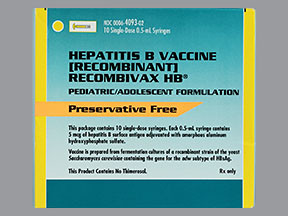
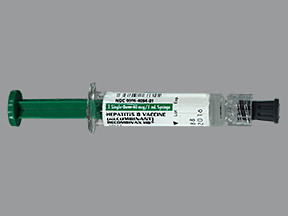
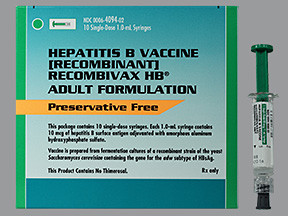
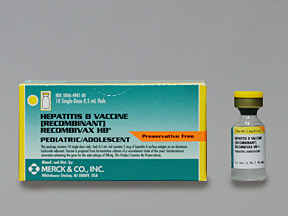
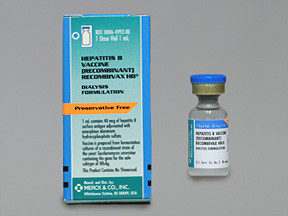
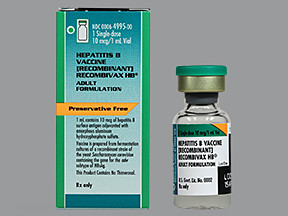
No Reviews Yet